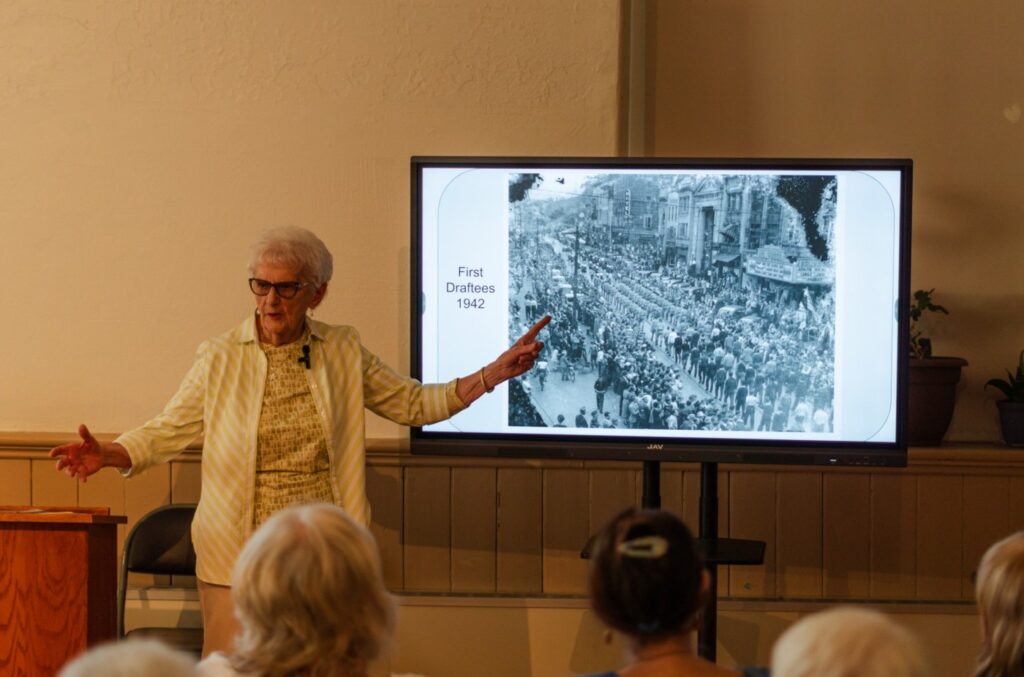
UPDATE: A remarkable account of life during World War II was shared by Dorothy Lehman, a 96-year-old resident of Pottsville, during a poignant talk at the Schuylkill County Historical Society on August 14, 2025. Her memories, rooted in a time of immediate national crisis, resonate deeply even 84 years later.
On December 7, 1941, a day that would forever change America, young Lehman was abruptly called home from a friend’s house. As she joined her family around the radio, President Franklin D. Roosevelt’s voice echoed through their living room, announcing the attack on Pearl Harbor. “My parents and grandparents were sitting around the radio and President Roosevelt was talking about a place called Pearl Harbor,” Lehman recalled, emphasizing the shock that rippled through her childhood world.
This urgent moment marked the United States’ entry into World War II, fundamentally altering the lives of millions, including Lehman, who was only 13 at the time. Her reflections came on the 80th anniversary of the war’s end, providing a powerful lens into the past for over 50 attendees.
Lehman’s vivid recollections included humorous anecdotes and serious reflections on the sacrifices made. “In 1941, young women wore skirts, not slacks, and silk stockings were a requirement,” she said. However, with silk diverted for parachutes, stockings became scarce, prompting creative solutions that left the audience laughing, especially when she shared how makeup was used to simulate stockings until rain ruined the illusion.
The impact of the war was palpable in Pottsville, where young men marched up Centre Street to enlist, and women became the famed “Rosie-the-Riveters,” contributing to the war effort in factories. “My father volunteered as an air raid warden, ensuring that shades were drawn during warnings. If they weren’t, you got a knock on the door,” she recounted.
Daily life was transformed by rationing—food, gasoline, and even shoes were scarce. “You took old shoes to be resoled instead of buying new ones,” she explained. Schools served Spam-on-lettuce sandwiches, while butter was replaced by oleo margarine, which had to be mixed with red dye to resemble the real thing.
Lehman’s story underscored the collective resilience of her generation. “Nobody complained,” she stated. “We were at war.” The funding for the war came from the American people through war bonds, which many saved for until they had enough to purchase. “People saved their quarters until they got $18 to buy a bond, which could be redeemed for $25 later,” she detailed.
The realities of war were communicated through radio broadcasts and censored letters, maintaining a sense of uncertainty. Lehman had a pen pal in England, yet their correspondence never discussed the bombings in London. The painful reality of loss struck home when her principal announced the death of a local soldier, a moment that silenced the previously lively assembly.
As the war ended on September 2, 1945, jubilant crowds flooded the streets of Pottsville. “There were people, shoulder-to-shoulder, yelling,” she remembered, a stark contrast to the palpable tension that had gripped the nation just a few years prior.
Lehman, a former choir director and organist, remains actively involved in her community, volunteering at the historical society’s photo archive. Her narratives not only preserve history but also serve as a bridge connecting younger generations to the sacrifices and experiences of those who lived through one of the most tumultuous times in modern history.
As the world reflects on the lessons of the past, Dorothy Lehman’s stories remind us of the enduring spirit and resilience of those who faced adversity with courage and humor. Her experiences highlight the importance of remembering history as we navigate present challenges.







